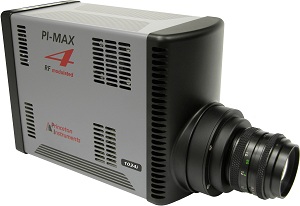Princeton Instruments (Trenton, New Jersey, USA) is pleased to announce the launch of its PI-MAX4:1024i-RF intensified CCD camera for frequency domain scientific imaging and spectroscopy applications.

As the most recent addition to the acclaimed PI-MAX product line, this unique, fully integrated system utilizes a fiber optically coupled ICCD camera and affords users comprehensive control of experiments via Princeton Instruments 64-bit LightField software.
The PI-MAX4:1024i-RF camera enables frequency domain measurements for fluorescence lifetime studies utilizing minimal external equipment. By modulating the gain of its Gen III filmless intensifier at a radio frequency (RF) rate between 1 MHz and 200 MHz, the camera operates as a 2D lock-in amplifier. Each pixel acts as an individual phase-sensitive (lock-in) detector. Camera applications include fluorescence lifetime imaging microscopy (FLIM), fluorescence resonance energy transfer (FRET), time-resolved imaging and spectroscopy, plasma diagnostics, combustion studies, planar laser-induced fluorescence (PLIF), and particle imaging velocimetry (PIV).
The new PI-MAX4:1024i-RF features two independent built-in direct digital synthesizers. One synthesizer generates the RF to modulate the intensifier, while the other provides a user-controlled RF signal that can be utilized to modulate the illumination in order to accomplish RF phase-sensitive detection. An advanced graphical user interface (GUI) allows users to select modulation frequency, control phase sweep range and granularity, and set RF output p-p voltage levels. Furthermore, the camera is capable of a 1 MHz sustained repetition rate, can allow two images to be captured in rapid succession, boasts superb system linearity, and utilizes a high-bandwidth GigE data interface. A built-in precision timing generator, SuperSynchro, offers time resolution of 10 ps and provides the lowest possible jitter (35 ps). Independent trigger outputs (i.e., SyncMaster1 and SyncMaster2) eliminate the need for an external timing generator.
The PI-MAX4:1024i-RF is fully supported by Princeton Instruments LightField 64-bit data acquisition software platform that has been designed “from the ground up” for scientific imaging and spectroscopy. LightField provides complete camera control via easy-to-use tools that help streamline experimental setup, data acquisition, and post processing. LightField is an excellent solution for multi-user facilities. The platform remembers each user’s hardware and software configurations and tailors its own features accordingly, displaying all relevant tools via an intuitive GUI. For more information, please refer to www.pimax4.com